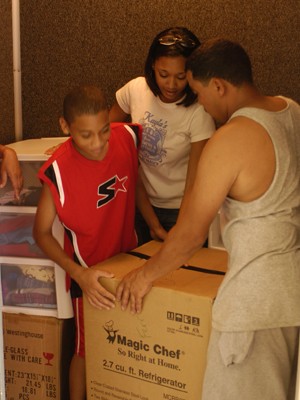
Residence halls full
The hallways of the residence halls before move-in day are unusually quiet for the few students who have moved into the residence halls early.
The floors are clean and clear of debris. Hall bulletin boards and room doors are decorated with information about potential opportunities for involvement on campus.
With the official opening of the residence halls approaching on Sunday, Residence Life and Student Housing staff members are preparing for the arrival of more than 2,000 students.
While the residence halls are all at capacity, approximately 30 students are still unsure about their housing situation for the fall semester because the halls were overbooked.
‘The overbooking situation is typical at this time of year because we can”t exactly predict the number of first-year students living on campus and the number of returning residents,’ said Doug Hallenbeck, director of Residence Life and Student Housing. ‘Overbooking allows us to house people who really want on-campus housing and keeps us from losing revenue when some students cancel housing or don”t show up.’
Students who want to live on campus but are not assigned their own rooms may be assigned to temporary housing such as guests rooms in residence halls, in SMU apartments, or with resident assistants in the residence halls.
Resident assistants are usually promised their own rooms.
‘We are doing all we can to make the students feel welcome and will do our best to put them in a permanent housing assignment,’ Hallenbeck said.
More than 1,300 of the more than 2,000 residents are first-year students, all of whom are guaranteed on-campus housing.
Because SMU requires first-year students to live on campus unless they are from the Dallas area, 93 percent of the first-year class lives on campus, while the remaining students live at home.
Transfer students and upperclassmen are most affected by overbooking because they are not guaranteed on-campus housing.
RLSH makes an effort not to overbook returning upperclassmen because, unlike first-year student, upperclassmen have additional housing options.
‘We have been fortunate for the past several years because even with overbooking we have hit on target with the number of cancellations and the number of unassigned students,’ said RLSH Marketing and Housing Assignments Coordinator Susan Strobel Hogan.
‘Other universities have hundreds of assigned students waiting for on-campus housing and turn double rooms into triples or force students to rent hotel rooms, which SMU does not do,’ she said.
With the exception of 1999 where some students stayed in SMU guestrooms for an entire semester, RLSH has been able to find permanent housing for residents who were unassigned.
‘We like to give as many students as possible the opportunity to live on campus and to be involved in a crucial part of campus life,’ said North Area Coordinator Jessica Bowman.
RLSH is able to accurately predict the number of students who will live on campus because of its close relationship with the admissions office.
‘We [RLSH] share information with the admissions office regarding cancellations, admissions and predictions about the numbers of first-year students,’ Hogan said. ‘Because it is a joint process and information is shared between RLSH and admissions we are both able to predict targets we can hit.’
Although with few days remaining until move-in day some students still find themselves questioning where they will live.
However, RLSH remains optimistic that the students will be housed in on-campus housing.
‘We have been predicting the numbers of residents we will have on campus since February, and we will assign temporary housing to ensure that students who want to live on campus will be able to,’ Hallenbeck said.








